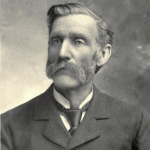
One of the founders of Boise City and one of the most active spirits in the upbuilding and progress of this thriving place during the past quarter of a century has been George D. Ellis, a pioneer of Idaho, whither he came in 1863. He is and has been the president of the Capital State Bank of Boise City for several years; is a stock-holder and general manager and treasurer of the electric street-car line of this place and is a stock-holder and a director of the Artesian Hot & Cold Water Company, besides having materially aided and fostered many other local enterprises calculated to benefit the city. He is a man of great public spirit, ever ready to do all in his power to promote the well-being of his brother men; and herein lies one of the secrets of his popularity.
By birth George D. Ellis is a Virginian, and comes from one of the honored old families of that state. His father, Thomas Ellis, married a lady of the same state. Miss Polly Ballard, and ten children were born to them, five of the number still living. Thomas Ellis, who was a soldier of the war of 1812, lived to be seventy-seven years of age, and his wife departed this life when in her seventieth year.
George D. Ellis was born in Albemarle County, Virginia, April 10, 1837, and received a common-school education. At nineteen he left home to make his own way in the world, and in 1856 he went to Kansas. Until 1860 he lived in Paola, and consequently was a witness of some of the thrilling events of that troublous period in the annals of “bleeding” Kansas. The “border ruffianism” of that region and the unscrupulous methods of local pro-slavery politicians made a good Republican of him, and from that time to the present he has never wavered in his allegiance to the party. From Kansas he went to Colorado, where he engaged in mining in the vicinity of Gregory and met with a fair measure of success. At the end of three years he came with a mule team to Idaho City, and having obtained a claim he and his companions engaged in mining and took out about ten dollars a day apiece. For several years thereafter he was connected with agricultural enterprises and also engaged in contracting and building, for he had learned the carpenter’s trade years before. For ten years, also, he freighted from Kelton to Boise City and other points. At Boise City he took up one hundred and forty acres of land, and in partnership with T. Davis planted the first apple orchard in the territory. Later, he sold the farm to Mr. Davis, and purchased three hundred acres northwest and outside the boundary of Boise City. On this property he erected a comfortable house and made other improvements, and as he went there to dwell in 1876 the place has been called the Centennial Ranch. The farm is a valuable one, producing grain, timothy, etc., and is one of the best managed homesteads in this section of the state.
In the Methodist denomination Mr. Ellis has been a power in Idaho, using his means and influence liberally toward the upbuilding and spreading of Christianity. He was given the contract for the building of the large, substantial brick church at Boise City, and for twenty years he was superintendent of the Sunday school. He is a man of undoubted integrity and uprightness, and no citizen here is held in higher esteem.
In 1873 Mr. Ellis married Miss Telitha Stafford, a native of Illinois. This worthy couple, having no children of their own, took into their hearts and home two boys and two girls, and reared them to manhood and womanhood. They are all respected and useful citizens, and look upon their devoted foster parents with the love and veneration which is their just due. Olive Ellis West is the wife of C. H. Packingham, and the other daughter is now Mrs. E. W. Brown. William Stafford is a well-to-do and successful farmer, and Robert Jago, the youngest of the children of Mr. Ellis, is still attending school.
